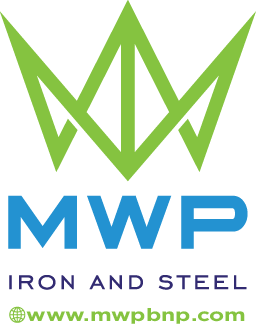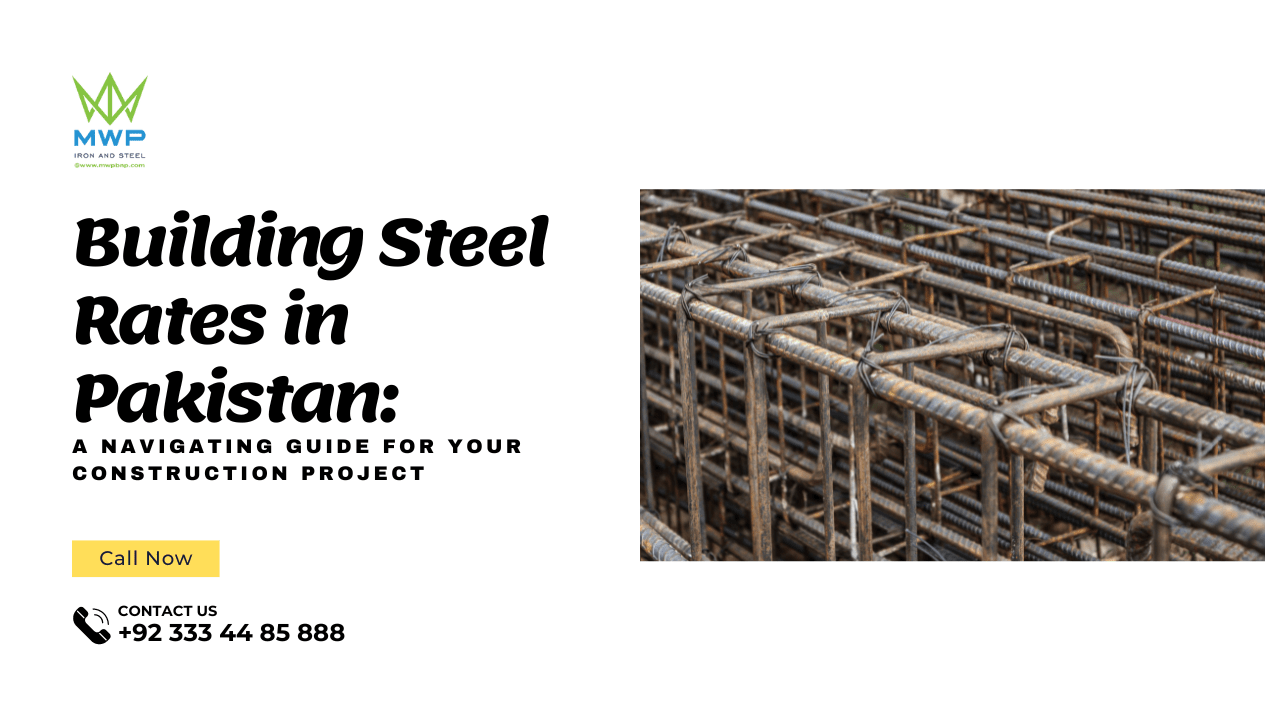Building Steel Rates in Pakistan
Building Steel Rates in Pakistan: Fear not, Pakistani builders! This guide is your lifeline, navigating the treacherous waters of volatile steel rates and equipping you to build your dream within budget. We’ll dive deep into the types of steel used in Pakistan, dissect the factors influencing their prices, and unveil smart strategies to optimize your construction budget. So, grab your hard hat and a cup of chai – it’s time to conquer the steel beast and turn your blueprints into reality!
In this comprehensive guide, you’ll discover:
- The essential types of building steel used in Pakistan, from the workhorse Saria bars to the sleek TMT warriors.
- The different grades of steel, each with its own strengths and price tag, helping you choose the perfect match for your project.
- The current landscape of building steel rates, with real-time prices per kilogram and metric ton, keeping you informed and empowered.
- The invisible forces behind the price fluctuations, from global market trends to government policies, giving you a deeper understanding of the game.
- Practical tips and tricks to outsmart the market, from alternative materials to negotiating with suppliers, turning you into a budget-savvy construction ninja.
So, take a deep breath, fellow dreamers. With the right knowledge and this guide as your compass, you can navigate the steel storm and build the future you deserve. Let’s turn those crumbled castles back into soaring dreams, brick by steel bar, together!
Key Takeaways:
- Steel rates in Pakistan are affected by production costs, demand and supply, import duties and taxes, inflation, and global market trends.
- MWPBNP offers a range of steel products, including MS Deform Bars, MS Chowkat, MS Pipe, and Iron.
- Understanding the factors that affect steel rates in Pakistan can help builders and contractors make informed decisions when purchasing steel products.
I. Understanding Steel Rates in Pakistan
Steel is a vital component in the construction industry, and its rates can have a significant impact on building projects. In Pakistan, the steel industry is growing rapidly, with numerous manufacturers and suppliers offering a range of steel products. However, the rates of steel in Pakistan are affected by several factors, including production costs, demand and supply, import duties and taxes, inflation, and global market trends.
Production Costs:
Production costs are a significant factor that affects steel rates in Pakistan. The cost of raw materials, labor, and energy are the primary components of production costs. The cost of raw materials, such as iron ore and coal, can fluctuate depending on global market trends. Moreover, the cost of energy, which is required to produce steel, can also affect production costs.
Demand and Supply:
The demand and supply of steel in Pakistan also affect its rates. When demand for steel is high, and supply is limited, steel rates tend to increase. Conversely, when demand is low, and supply is abundant, steel rates tend to decrease. The need for metal used for construction in Pakistan is affected by factors such as building things, building roads, bridges, and other things everyone needs, and making things in factories.
Import Duties and Taxes:
Import duties and taxes also play a significant role in affecting steel rates in Pakistan. Pakistan imports a significant portion of its steel requirements, and the duties and taxes imposed on imported steel can affect its rates. The government of Pakistan has imposed duties and taxes on imported steel to protect the domestic industry and generate revenue.
Inflation:
Inflation is another factor that affects steel rates in Pakistan. Inflation refers to the rate at which prices for goods and services are rising. When inflation is high, the cost of goods and services, including steel, tends to increase. Therefore, inflation can affect the demand and supply of steel, which in turn can affect its rates.
Global Market Trends:
Global market trends also affect steel rates in Pakistan. The global demand for steel, production costs, and trade policies can all impact steel rates in Pakistan. For instance, if the global demand for steel increases, the price of steel in Pakistan may also increase due to limited supply.
II. Steel Products Offered by MWPBNP
MWPBNP offers a range of steel products, including MS Deform Bars, MS Chowkat, MS Pipe, and Iron. These products are widely used in construction, infrastructure development, and industrial production.
MS Deform Bars:
MS Deform Bars are steel bars with ridges or bumps used in construction to strengthen concrete. They help the concrete grip better. MWPBNP offers MS Deform Bars in various sizes and grades, including Fe415, Fe500, Fe550, and Fe600.
MS Chowkat:
MS Chowkat is a type of steel used in construction for making grills, windows, and doors. MWPBNP offers MS Chowkat in various sizes, including 1-inch, 1.5-inch, and 2-inch.
MS Pipe:
MS Pipe is used in various applications, including water supply, drainage, and gas pipelines. MWPBNP offers MS Pipe in various sizes and thicknesses, including 1/2 inch, 3/4 inch, 1 inch, 1.5 inches, and 2 inches.
Iron:
Iron is a versatile steel product used in various applications, including construction, machinery, and equipment. So, MWPBNP offers iron in various forms, including iron rods, iron sheets, and iron angles.
Steel Products Offered by MWPBNP
| Steel Products | Description |
|---|---|
| MS Deform Bars | Ribbed or deformed steel bars used for reinforcing concrete |
| MS Chowkat | Steel used for making grills, windows, and doors |
| MS Pipe | Steel pipe used for water supply, drainage, and gas pipelines |
| Iron | Versatile steel product used in construction, machinery, and equipment |
Factors Affecting Steel Rates in Pakistan
In addition to production costs, demand and supply, import duties and taxes, inflation, and global market trends, there are several other factors that can affect steel rates in Pakistan.
Government Policies:
Government policies can also affect steel rates in Pakistan. For instance, the government can impose tariffs or taxes on imported steel, which can increase its cost. Moreover, government initiatives to promote infrastructure development and construction can increase the demand for steel, leading to higher prices.
Supply Chain Disruptions:
Supply chain disruptions, such as transportation delays or shortages, can also affect steel rates in Pakistan. When there are disruptions in the supply chain, the availability of steel can decrease, leading to higher prices.
Natural Disasters:
Natural disasters, such as earthquakes, floods, and hurricanes, can affect steel rates in Pakistan. These disasters can disrupt the supply chain, leading to shortages and higher prices. Moreover, the demand for steel can increase in the aftermath of a disaster, leading to higher prices.
Global Economic Conditions:
Global economic conditions can also affect steel rates in Pakistan. A global economic downturn can decrease the demand for steel, leading to lower prices. Conversely, a global economic upswing can increase the demand for steel, leading to higher prices.
Tips for Builders and Contractors:
To make informed decisions when purchasing steel products, builders and contractors should consider the following factors:
- Plan Ahead:
Plan your steel requirements in advance to avoid last-minute purchases, which can lead to higher prices. - Compare Prices:
Compare prices of different steel suppliers to get the best deal. - Consider Alternatives:
Consider alternative steel products that can meet your requirements at lower prices. - Negotiate:
Negotiate with the supplier to get the best price possible. - Consider the Long-Term:
Consider the long-term cost of steel products, including maintenance and replacement costs.
Conclusion:
The price of steel in Pakistan can change for different reasons. Some of these reasons include:
- How much it costs to make: This includes the cost of raw materials, labor, and energy.
- How much people want to buy and sell: If more people want to buy steel than there is available, the price will go up. If more people want to sell steel than there are buyers, the price will go down.
- Taxes: The government can charge taxes on steel, which can make it more expensive.
- The overall cost of living: If the cost of everything else in Pakistan goes up, the price of steel will usually go up too.
- What’s happening with steel prices around the world: If the price of steel goes up in other countries, it will often go up in Pakistan too.
By understanding these factors and considering the tips outlined above, builders and contractors can make informed decisions when purchasing steel products.
MWPBNP sells different types of steel, like bars, sheets, pipes, and plain iron. So, these are common materials for building houses, roads, and factories.
Summary of Factors Affecting Steel Rates in Pakistan
| Factors Affecting Steel Rates in Pakistan | Description |
|---|---|
| Production Costs | Cost of raw materials, labor, and energy |
| Demand and Supply | Balance between demand and supply of steel |
| Import Duties and Taxes | Duties and taxes imposed on imported steel |
| Inflation | Rate at which prices for goods and services are rising |
| Global Market Trends | Global demand for steel, production costs, and trade policies |
| Government Policies | Tariffs, taxes, and initiatives to promote infrastructure development and construction |
| Supply Chain Disruptions | Transportation delays or shortages |
| Natural Disasters | Disruptions in supply chain, leading to shortages and higher prices |
| Global Economic Conditions | Global economic downturn or upswing |
Related Article:
CGI Sheets Price in Islamabad: Build Smart, Pay Fair 2024 Guide

